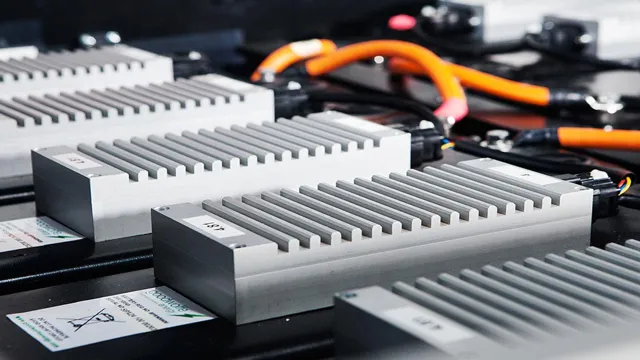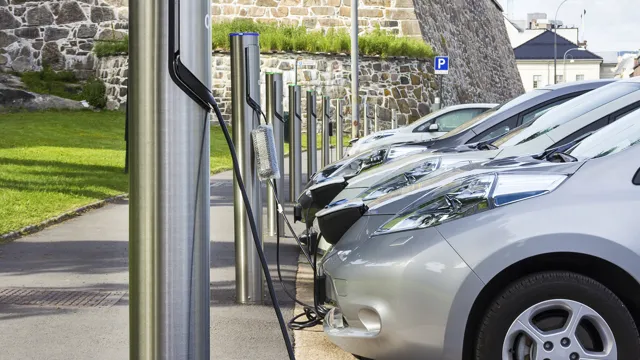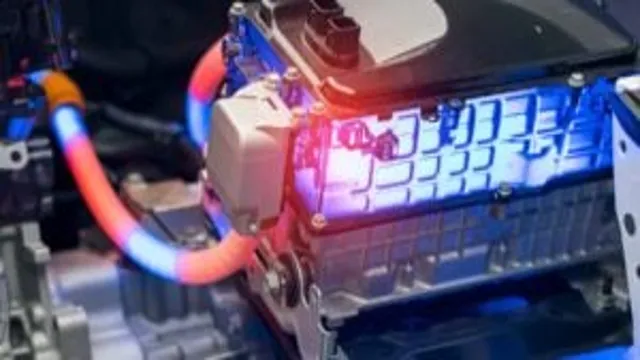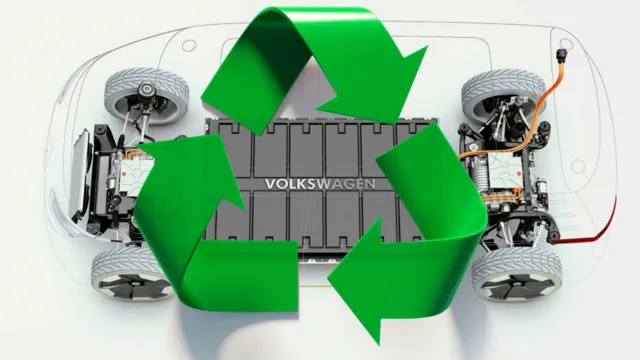Revolutionizing the Future of Electric Cars with Solid-State Batteries: A Comprehensive Guide
As the world becomes more concerned about the environment, electric vehicles (EVs) are gaining popularity as a sustainable mode of transportation. However, the current EV technology still has its limitations, particularly in the battery department. The good news is that scientists and researchers have been working tirelessly to revolutionize the EV industry with the introduction of solid-state batteries.
Solid-state batteries are the next big thing in EVs. They offer several advantages over the traditional lithium-ion batteries used in most EVs today. For one, they are much safer and less prone to catching fire.
Solid-state batteries can provide a higher energy density, allowing EVs to run for longer periods on a single charge. They are also more durable, with a longer lifespan compared to lithium-ion batteries. The technology for solid-state batteries is still in its early stages, with several companies trying to bring it to the market.
However, the potential impact of solid-state batteries on the EV industry is immense. They could pave the way for faster charging times, greater driving ranges, and ultimately, a broader adoption of EVs. Despite the progress made in developing solid-state batteries, many obstacles remain.
The biggest challenge is scaling up production to meet the increasing demand for EVs. However, with advancements in materials science, it’s only a matter of time before solid-state batteries become widely available. In conclusion, the EV industry is on the brink of a major revolution thanks to solid-state batteries.
They hold the key to unlocking the full potential of EVs and making them a more viable and sustainable mode of transportation. While there are still hurdles to overcome, it’s exciting to see how this technology will evolve in the years to come.
What Are Solid-State Batteries?
Electric car solid-state batteries are a new promising technology that could significantly enhance the efficiency, range, and safety of electric vehicles. Unlike conventional lithium-ion batteries, solid-state batteries use solid electrolytes instead of liquid ones, which provide several advantages. Firstly, solid electrolytes reduce the risk of fire hazard, leakage, and thermal runaway that can occur with liquid electrolytes.
Secondly, solid-state batteries can store more energy and charge faster due to their higher energy density and conductivity. Besides, they can operate at a wider temperature range, making them suitable for extreme conditions. Despite these advantages, the production and scaling up of solid-state batteries are still under development, and it may take some time to become commercially viable.
However, many leading automakers and battery makers are investing heavily in solid-state battery research, and we may see electric vehicles powered by solid-state batteries in the near future.
Explaining the Science Behind Solid-State Batteries
Solid-state batteries are the latest innovation that is set to revolutionize the way we use batteries. These batteries are different from traditional lithium-ion batteries, which use liquid electrolytes to store energy. Solid-state batteries use solid electrolytes, which means that they are more stable and much safer, as there is no risk of the electrolyte leaking or catching fire.
Solid-state batteries also have higher energy densities, which means they can store more energy in a smaller space. This technology is still in the developmental stages but has the potential to change the way we power our devices, from smartphones to electric vehicles.
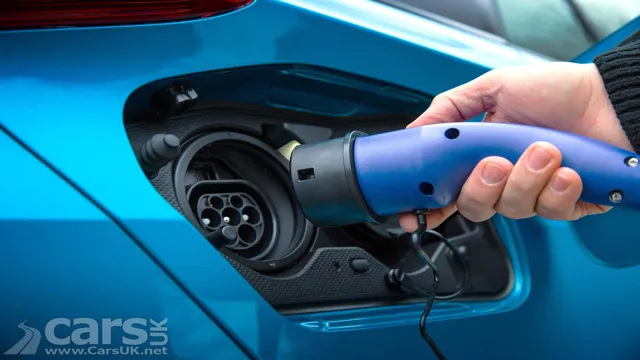
Advantages of Solid-State Batteries in Electric Cars
Solid-state batteries are a revolutionary technology that could transform the electric vehicle industry. Unlike traditional lithium-ion batteries, which use a liquid electrolyte to transfer energy between the positive and negative electrodes, solid-state batteries use a solid electrolyte. This makes them significantly safer, due to the reduced risk of overheating and fire, as well as more efficient, with potentially longer lifespans and faster charging times.
Additionally, solid-state batteries have the potential to offer higher energy densities, allowing EVs to travel further on a single charge. While the technology is still in development, some companies have already begun integrating solid-state batteries into their electric vehicles, and experts predict that they could become the dominant battery technology in the near future.
Current Challenges and Future Outlook
One of the current challenges in the electric car industry is the search for solid-state batteries that can provide an even higher level of performance than the lithium-ion batteries currently in use. Solid-state batteries have the potential to be more energy-dense, safer, and longer-lasting than their liquid counterparts. However, the technology is still in its early stages and several hurdles need to be overcome before it can be widely adopted.
One of the biggest challenges is finding a suitable material for the solid electrolyte that separates the positive and negative electrodes. Researchers are also working on enhancing the stability of solid-state batteries by minimizing dendrites, which are metal deposits that can short-circuit the battery and potentially cause a fire. Despite these challenges, the future outlook for solid-state batteries in electric cars is promising, as they offer a potential solution to many of the problems associated with traditional lithium-ion batteries.
Challenges in Manufacturing Solid-State Batteries
Solid-state batteries are a promising alternative to traditional lithium-ion batteries, but their production has some challenges that make them difficult to manufacture on a large scale. One of the main issues is the cost, as solid-state batteries require expensive materials and are more complex to produce. Additionally, the manufacturing process is still in its early stages, so it’s not yet clear how long it will take to develop a reliable, efficient production process.
Other challenges include achieving high energy density, improving stability and reliability, and ensuring the safety of the battery. Despite these challenges, many researchers are optimistic about the future of solid-state batteries, and are working to overcome these obstacles through innovative solutions and advancements in technology. With the potential to offer higher energy densities, longer lifetimes, and improved safety, solid-state batteries could revolutionize the way we power everything from electric vehicles to smartphones.
Promising Developments in Solid-State Battery Technology
The development of solid-state battery technology shows a lot of promise in revolutionizing the future of batteries. Unlike conventional batteries that use liquid electrolytes, solid-state batteries use solid electrolytes, which provide a host of benefits, including increased safety, higher energy density, and longer lifespan. However, there are still some challenges in this technology that need to be addressed before it can realize its full potential.
One of the biggest obstacles is the cost of production, as the solid electrolytes used in these batteries are more expensive to manufacture. There are also issues with the mechanical stability of solid electrolytes, especially when they are subjected to high stress or temperature changes. Despite these challenges, researchers and companies are actively developing solid-state batteries, and there is optimism that they will become a practical and cost-effective solution in the near future.
Solid-state batteries could potentially power everything from electric vehicles to portable electronics, leading to a more sustainable and environmentally friendly future.
Timeline for Solid-State Batteries in EVs
The timeline for solid-state batteries in electric vehicles (EVs) is constantly evolving as companies work to overcome current challenges in production and implementation. While solid-state batteries have the potential to offer higher energy density, faster charging times, and increased safety compared to traditional lithium-ion batteries, there are still concerns over cost-effectiveness and scalability. However, many experts anticipate that solid-state batteries will become a standard component in EVs within the next decade.
In the meantime, research and development efforts are focused on improving the stability and longevity of solid-state batteries, as well as finding ways to mass-produce them at a feasible cost. It’s an exciting time for battery technology, and the race to create the ideal solid-state battery is well underway.
The Impact of Solid-State Batteries on EV Technology
Solid-state batteries are set to revolutionize the electric vehicle (EV) industry by offering a more efficient and safer alternative to conventional lithium-ion batteries. Solid-state batteries are characterized by their solid electrolyte rather than the liquid or gel electrolyte present in lithium-ion batteries. This means they store energy more densely and can be charged faster without the risk of overheating or catching fire.
Furthermore, solid-state batteries are expected to have a longer lifespan and retain their charge capacity even in extreme temperatures. With research and development in solid-state batteries gaining steam, we can expect the next generation of EVs to have longer driving ranges and shorter charging times. These improvements will undoubtedly result in increased adoption of EVs and help reduce our carbon footprint.
Increased Range and Energy Efficiency in EVs
Solid-state batteries are poised to revolutionize the electric vehicle industry by increasing range and energy efficiency. These high-capacity batteries contain solid electrolytes instead of the liquid ones found in typical lithium-ion batteries. This means they are less prone to overheating and have a longer lifespan.
With their higher energy density, EVs equipped with solid-state batteries could travel farther and require less frequent recharging. Additionally, the elimination of liquid electrolytes makes these batteries safer and less prone to leakage. While the technology is still in the development stage, major automakers are investing heavily in research and development to make solid-state batteries a reality for consumers.
By incorporating solid-state batteries into their EVs, automakers can tackle two of the biggest challenges facing the industry: range anxiety and limited access to charging stations. The future of EV technology is rapidly changing, and solid-state batteries offer a promising path towards more accessible, efficient, and sustainable transportation for all.
Reduced Battery Size and Weight
Solid-State Batteries Solid-state batteries are poised to revolutionize the electric vehicle (EV) industry, as they offer significant advantages over traditional lithium-ion batteries. One of the key benefits of solid-state batteries is their reduced size and weight. Due to their solid electrolyte, they do not require heavy and bulky cooling systems, which are typically required to maintain the safety and stability of lithium-ion batteries.
This means EV manufacturers can reduce the size and weight of their battery packs, resulting in lighter and more compact vehicles with increased range and performance. With solid-state batteries, EVs can travel farther on a single charge, making them more practical for everyday use. The development of solid-state batteries is a game-changing technology that will transform the EV industry, making it more accessible and affordable for consumers across the globe.
Conclusion: The Future of EVs with Solid-State Batteries
In conclusion, solid-state batteries are the future of electric cars. With their improved safety, longer lifespan, and increased energy density, these batteries offer a promising solution to the limitations of traditional lithium-ion batteries. As we continue to push the boundaries of technology and innovation, the electric car industry is poised to revolutionize the way we drive and interact with our environment.
So, strap in and get ready for the electric ride of your life, powered by the marvels of solid-state batteries!”
FAQs
What are solid-state batteries for electric cars?
Solid-state batteries are a new type of battery technology that uses a solid electrolyte instead of the liquid electrolyte used in traditional batteries.
What are the benefits of using solid-state batteries in electric cars?
Solid-state batteries have the potential to provide higher energy density, faster charging times, longer lifespan, and improved safety compared to traditional batteries.
Are solid-state batteries currently being used in electric cars?
While several companies are developing solid-state batteries for electric cars, they are not yet in widespread use and are still in the prototype stage.
When can we expect to see solid-state batteries in commercial electric cars?
It is difficult to predict an exact timeline, but some experts believe that solid-state batteries could begin to appear in commercial electric cars within the next 5-10 years.

